#brain health
Text
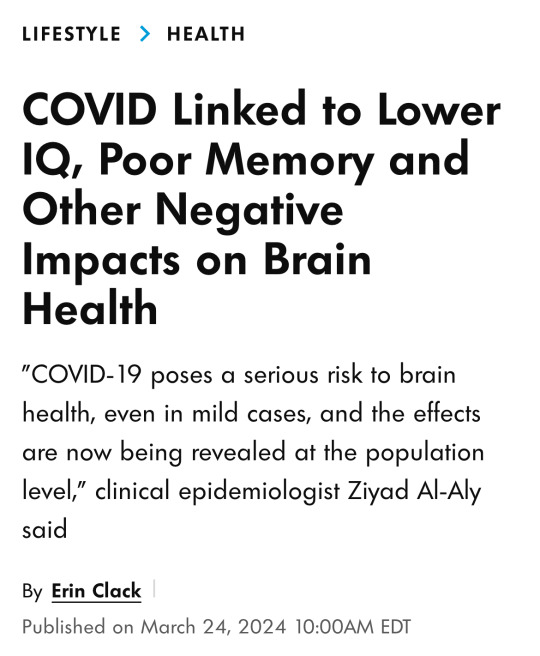

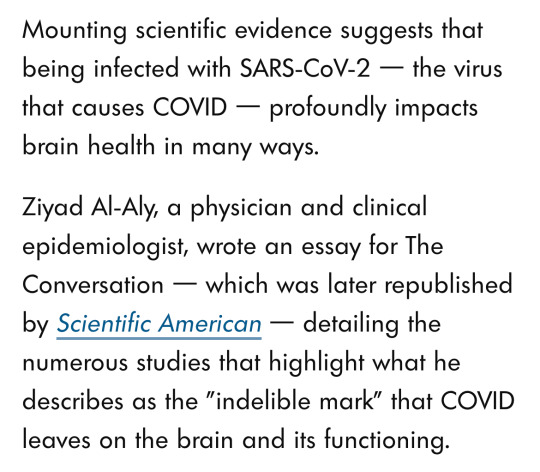
side-eyeing all the anti-vaccine, anti-masks, "get back to normal," "the kids will be fine" fucktwats hella hard right now. fuck everyone one of you.
#COVID#brain health#cognitive deficits#memory problems#brain inflammation#brain aging#brain volume#brain structure#COVID-19#SARS-CoV-2#long COVID#brain damage#dementia#autopsies#respiratory virus
81 notes
·
View notes
Link
In a groundbreaking advancement, researchers from Stanford University have developed a speech brain-computer interface (BCI) that holds significant promise for individuals with paralysis. By capturing neural signals generated during attempted speech through intracortical microelectrode arrays, this novel BCI achieved remarkable results. A participant afflicted with amyotrophic lateral sclerosis (ALS), rendering them unable to speak coherently, achieved an impressive 9.1% word error rate with a 50-word vocabulary and a 23.8% error rate with a vast 125,000-word vocabulary. This marks the first successful demonstration of decoding speech from a large vocabulary using such technology. Notably, the BCI enabled speech decoding at a rapid pace of 62 words per minute, surpassing prior records by 3.4 times. Encouragingly, the study revealed neural patterns that facilitate accurate decoding from a small cortical region and retained detailed speech representations even after years of paralysis. These findings illuminate a promising path toward restoring efficient communication for paralyzed individuals who have lost the ability to speak.
The organization of orofacial movement and speech production within the motor cortex at a single-neuron resolution is not very well-known. To explore this, neural activity was recorded through four microelectrode arrays, two in the ventral premotor cortex (area 6v) and two in area 44, a component of Broca’s area. The participant, who had bulbar-onset ALS, exhibited restricted orofacial movement and vocalization capabilities but lacked intelligible speech. The findings revealed distinct patterns in area 6v, where strong tuning was observed across all tested movement categories.
This encompassed the successful decoding of various orofacial movements, phonemes, and words with high accuracy. In contrast, area 44, previously linked to higher-order speech aspects, exhibited negligible information related to these categories. Interestingly, speech decoding proved more precise in the ventral array, particularly during the instructed delay phase, aligning with language-associated networks identified through fMRI data.
Continue Reading
132 notes
·
View notes
Text

Set your day up right! I have been enjoying these breakfasts by EatingWell, with my own twist on them. I hope they inspire you to try something new. If you're bored with what you eat, it's time to switch it up! What does your breakfast look like?




#breakfast#healthy breakfast#guthealth#gut health#brain health#brain food#food#foodlover#foodporn#plant based#vegan#vegetarian#recipes#vegan recipes#healthy recipes#meal ideas#breakfastofchampions#vegan breakfast#breakfast ideas#Nutrition#health tips#Healthy#Health#heathy living#healthy lifestyle#healthy habits#healthy foods#healthy life
51 notes
·
View notes
Text
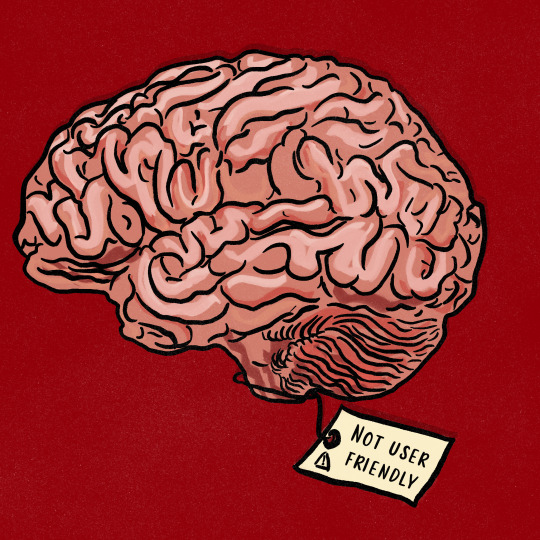
Not "user-friendly".
Wish it came with a manual or something.
#adhd#adhd brain#adhd problems#adhd women#nlp#nlp techniques#learning tips#train your brain#brain health#mental health#brainpower#self love#digital art#illustration#women artist
35 notes
·
View notes
Text
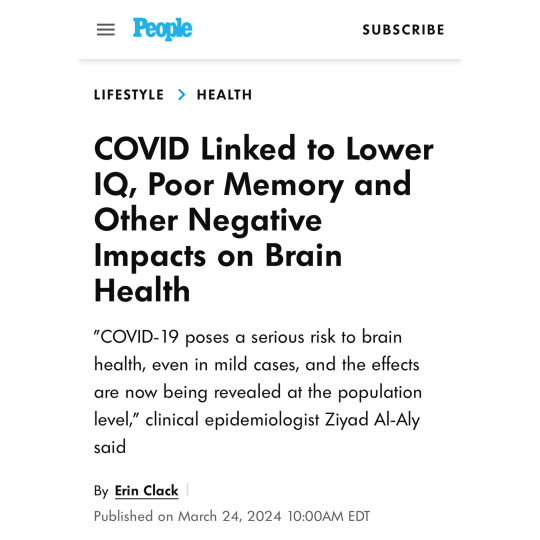
Stay at home when ill, avoid indoor bad ventilation, open windows, wear masks, keep your vaccinations up to date. 🧠
https://people.com/covid-linked-lower-iq-poor-memory-other-negative-impacts-brain-health-8619254
#long covid#covid is airborne#covid#covid 19#covid isn't over#covid conscious#health#brain#brain health#medicine
8 notes
·
View notes
Text
7 Proven Strategies to Eliminate Brain Fog, Enhance Focus, and Boost Mental Clarity
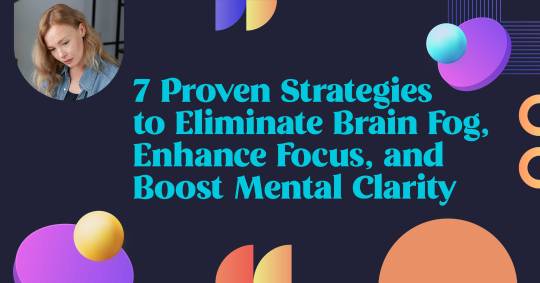
Brain fog is a term used to describe a state of cognitive confusion, forgetfulness, and lack of focus. It’s not a medical condition per se, but rather a symptom of various underlying health issues. Dispersing this fog isn’t an impossible task; it just requires some effective strategies and lifestyle modifications.
Read more: https://medium.com/iq-test/7-proven-strategies-to-eliminate-brain-fog-enhance-focus-and-boost-mental-clarity-1f2d5b3a1c7a
#brain fog#focus#mental clarity#mental health#quality sleep#exercise#mindfulness#meditation#iqtest#brain health
8 notes
·
View notes
Text
The Bipolar Brain: An Introduction
Key Terms
Bipolar: Previously called 'manic-depression' due to the nature of the mania being rooted in depression, this mood disorder is characterized by periods of mood shifts between a manic and depressed state.
Depression: A period of rest after deeply distressing events
Dopamine: A brain chemical meant to encourage pleasure, satisfaction, and motivation.
Grey matter: Also known as the cortex of the brain, this is the outer layer of the brain allows a person to have control over movement, memory, and emotions by sending signals between the different parts of the brain.
Hippocampus: The part of the brain where memories are "stored" to later be relayed to other parts of the brain, consciously or not. It is one of the deepest parts of the brain structure, making signals difficult to send or receive.
*Hypomania: A form of mania that is less severe or impactful than true mania.
Limbic system: Processes emotions and behaviors to help other parts of the brain understand survival necessities.
*Mania: A false sense of euphoria, triggered by stress
Prefrontal Cortex: The part of the brain at the front center, which controls decision making, emotional management, and impulse control.
Type 1 Bipolar: Characterized by mania that is more intense and/or frequent than depression.
Type 2 Bipolar: Characterized by depression that is more intense and/or frequent than hypomania; type 2 bipolar people do not experience "true mania".
*For the sake of this post, "mania" will refer to both hypomania and true mania. When the information only applies to true mania, it will be called "true mania".
----------
Part One: Introduction
We will be exploring the development, behavior, and remission of bipolar brains, using information learned from neuroscience, psychology, and lived experiences of bipolar people. The purpose of this is to inform those with Bipolar how to understand their own brain and take control of the disorder. This post is written by someone diagnosed with Bipolar 2, receiving treatment in the form of medication and talk therapy.
----------
Part Two: Development
This mood disorder usually develops in childhood, but can develop at any point in a person's life. It is caused by trauma, as a response to stress. Most bipolar people also have family with the disorder, implying it is genetically predisposed.
In childhood, this disorder can begin to show symptoms as early as early adolescence. Children as young as 5 have been diagnosed with early onset bipolar disorder.
After traumatic events, such as abuse, neglect, or loss, the brain is forced to find a way to cope and manage complex stress. Trauma can range from mild to severe, and still trigger the onset of bipolar disorder.
During depression, the brain "mines" for dopamine, and during mania, the brain utilizes the dopamine. Over time, without treatment, the bipolar brain will struggle to maintain an effective dopamine-mining system, and these changes will even destroy grey matter in the brain, namely in the prefrontal cortex. This change in the brain makes it more difficult for the prefrontal cortex to communicate with the limbic system, causing less control over emotions and impulses, therefore causing more reckless decisions to be made.
Due to the nature of the relationship between the prefrontal cortex and the limbic system, these two parts of the brain need strong communication. With limited grey matter, signals are weakened, or missed completely.
The hippocampus is a major part of the limbic system, and without a proper connection to send signals between the hippocampus and the prefrontal cortex, it only becomes more difficult to recall past experiences or learned skills.
The longer a bipolar person goes without treatment, the worse their stress, and the worse they respond to stress. This disorder is degenerative, and those with Type 1 Bipolar show the most loss of grey matter.
----------
Part Three: Behavior
Like a pendulum, bipolar brains swing between manic and depressive sensations and behaviors. Here are some characteristics of mood swings:
When depressed, the bipolar person attempts to "fill the void", also known as "dopamine mining". This behavior accumulates dopamine over time but does not release it. This can look like sleeping a lot, escaping into a piece of media, or fixating on an accessible hobby.
During manic swings, the bipolar person uses the dopamine accumulated during depression to compensate for the time lost and labor neglected during depression. This may look like addressing the issue directly in hyper-fixation, or avoiding the issue altogether to indulge in self-pleasure.
Episodes are different than swings. Episodes can be placed on a specific timeframe, sometimes down to the hour. Behaviors are impulsive, emotions are overwhelming, and the decisions made during episodes reflect this heavily. Below are some characteristics of a Bipolar episode, based on type of episode.
In depressive episodes, the bipolar person will display their usual depressive behaviors at a more intense, more frequent rate, and will quickly begin taking on self-destructive behaviors in an effort to punish the self for failing to meet manic expectations. Essentially, the body has gotten used to using depression to recover, and if results are not met, the body "doubles down" as a means to "force" results, in an effort to trigger mania.
Manic episodes are intense highs, often causing changes to the bipolar person's life that normally wouldn't be considered, let alone acted on. There is a false sense of euphoria that controls the impulses and emotions of the bipolar person, causing a disconnect from reality that can lead to delusions and the development of compulsive thoughts or behaviors that enable more poor stress management skills, such as overspending or reckless sexual activity.
Mixed episodes can sometimes be the introduction or ending to a manic or depressive episode, but can also happen alone. The depression attempts to self-destruct while the mania's euphoria makes those behaviors seem euphoric and desirable. These episodes are often painful and typically short-lived compared to the other two, but not necessarily so.
----------
Part Four: Remission
There is a number of ways to treat bipolar brains, though medications and talk therapy, namely CBT and DBT, are the most commonly recommended. Some bipolar brains are medication resistant, so diligent habit seeking and a strong relationship with a therapist may be the best help. Below is an incomplete list of potential treatments, and why they work.
Medication can alter the chemical changes in the brain which trigger swings and episodes. Medication will not heal the brain, it will only control it while properly using the artificial chemicals. Medication plans must be specified to the patient, so trial and error is a necessary process for disordered medicated brains.
Talk therapy flexes the grey matter, and the grey matter may even be recovered in these thought exercises and memory training sessions. These changes are more likely to have a lasting impact, so long as the new habits and beliefs remain.
Diligent habit seeking, centered around self-care and growth, will help a bipolar brain take control of how they treat their stress. While swings may be unavoidable, building a set of healthy habits can alter the way these swings are 'engaged with', meaning behaviors can change. This can be a difficult form of treatment for bipolar people, as the disorder does not consistently provide motivation for habit changes. With a healthy outlook on relapses, this issue is resolved, and habit-seeking can continue even with relapses present.
Healthy coping mechanisms to replace mania are great ways to prevent manic episodes and swings, which will in turn prevent the 'need' for a depressive swing (to recover from manic burnout). These coping mechanisms can look different for each person, but no matter what, these mechanisms must be focused on growth - not escapism, passivity, or indulgence, which are manic behaviors that have been individualized.
Remission looks different for everyone, but no matter what, bipolar is a lifelong disorder. This means that even after years of successful treatment, with no swings or episodes, this disorder is almost guaranteed to make a comeback during high stress situations like abuse or loss. Anyone who has been diagnosed with bipolar should expect to keep their coping mechanisms going for life, and adjusting the mechanisms according to the needs of the changes in their life. There are a few things remission can grant a person, such as:
The ability to work on projects and tasks irregardless of current mood
Motivation to socialize even when the body seeks isolation, making relationships stronger and more consistent
A lack of shame for the disorder or what it has put you through, making stress management less about the desired results and more about the desired process
----------
Part Five: Conclusions
There is no known cure for bipolar disorder, but those with bipolar can take control of their circumstances in small but life changing ways. The bipolar brain is simply trying to thrive even in stressful circumstances, and has only learned one biochemical pattern to do so. Treatment is all about re-training the brain's response to stress. Those who have bipolar must stop identifying with their bipolar to effectively treat it, meaning they cannot embrace their mania as 'the best version of themselves' nor the other way around with their depression. These are not personality traits, because this is not a personality disorder; these are conditions the brain is currently in.
People with bipolar disorder are not to be ashamed of themselves for what they've done to cope during depressive swings or episodes. Shame is often what maintains the cycle, as this is a major driving force of impulsive behavior. The guilt, shame, and self-loathing of a bipolar person will hold them back from developing better ways to manage stress. With an effective, individualized treatment plan, bipolar people can find themselves in remission, but should expect and accept relapse if a major stress is to occur. This is not because the treatment isn't working anymore, but because this is how the brain has developed to respond to stress, and until we find a cure, bipolar brains are to be respected as brains attempting to thrive in unforeseen circumstances - a worthy pursuit that any self-loving person would take on.
----------
Additional notes:
Comorbidity with other mental conditions can cause symptoms to be more intense or more frequent. This includes conditions like PTSD, personality disorders or autism.
Many bipolar people seem to believe that their mania "helps them" - with things like getting projects and tasks done, or socializing. This is false. Mania is what uses the energy accumulated during depression to delude the bipolar person into thinking that the only way for them to get these things done is to indulge in manic behavior. Essentially, the bipolar person is the one helping themselves get their projects and tasks done, and mania is "taking the credit".
If you have been diagnosed with bipolar disorder, you have a strong will to thrive. Trust in this, and rely on that fact to help you change your habits so that your stress management system can adjust to a more stable, secure structure.
You must read the sources for a detailed look at the different topics and ideas shared here. This post is that of my own conclusions, based off of the information in these links plus my own experiences with Bipolar Type 2. I am not a professional, and this post should not be taken as mental health advice, but rather, an exploration from an unprofessional point of view. If you need mental health advice, seek therapy or psychiatric care, and take this information to them to see how it may apply to your life.
----------
Sources:
Bipolar experiences
Dopamine & Bipolar Relationship
Grey matter information
Hippocampus information
Limbic System information
Mania & Hypomania
Mixed episodes
Prefrontal Cortex Walkthrough
#bipolar#bipolar disorder#brain health#bipolar brain#hypomania#mania#depression#manic depression#brain structure#brain development#bipolar episode#mental health#mental healthcare#psychiatry#neuropsychology#psychology#neurology#bipolar treatment#bipolar type 1#bipolar type 2#my essays#my posts
53 notes
·
View notes
Text
Unlocking Your Potential: The Value of IQ Testing for Personal Growth

In an era where self-improvement and personal growth are at the forefront of many people's minds, understanding one's cognitive abilities can be a key step in this journey. IQ tests, long viewed as a measure of intellectual prowess, offer more than just a number; they provide insights into our problem-solving skills, logical reasoning, and potential areas of improvement. This article explores the benefits of taking an IQ test, particularly through officialiqtests.com, and why such an assessment can be an enlightening experience, especially for those immersed in the dynamic and thoughtful environment of online communities.
Why Consider an IQ Test?
IQ, or Intelligence Quotient, tests are designed to assess various cognitive abilities, including memory, attention, speed, and problem-solving skills. While traditionally associated with academic and professional settings, these tests have found a new relevance in personal development.
Self-Awareness: Understanding your cognitive strengths and weaknesses can lead to better decision-making in your personal and professional life.
Targeted Improvement: Knowing specific areas where your cognitive skills might lag provides an opportunity for focused self-improvement.
Brain Health: Regularly challenging your brain with IQ tests can be a form of mental exercise, contributing to overall brain health and agility.
Choosing the Right Platform: Why officialiqtests.com?
When deciding to take an IQ test, choosing the right platform is crucial. officialiqtests.com stands out for several reasons:
Accuracy and Reliability: The tests are designed by psychologists and cognitive scientists, ensuring accuracy and reliability.
User-Friendly Experience: The website offers a seamless and engaging testing experience, making it accessible for everyone.
Detailed Insights: After completion, you receive a comprehensive report, giving you a deeper understanding of your cognitive profile.
The Test Experience
Taking an IQ test on officialiqtests.com involves a series of questions that challenge different cognitive abilities. The questions are structured to progressively increase in difficulty, encouraging you to think critically and adapt your problem-solving strategies. After completing the test, you'll receive a detailed report that not only provides your IQ score but also breaks down your performance in various cognitive domains.
Conclusion
In conclusion, taking an IQ test, especially through a reputable platform like officialiqtests.com, can be a valuable tool in your personal development arsenal. It offers insights into your cognitive abilities, highlights areas for growth, and encourages mental agility. Whether you are a curious learner, a creative thinker, or someone seeking to understand themselves better, an IQ test is a step toward unlocking your potential.
Take the Test Today
Ready to discover more about your cognitive abilities? Visit officialiqtests.com and embark on a journey of self-discovery and personal growth.
#iq test#personal growth#brain health#self awareness#intelligence quotient#genius#smart#writers on tumblr#tumblog
12 notes
·
View notes
Text

9 May 2022
Effects of physical activity on the brain 🤸🏽
Simply moving your body has immediate, long-lasting and protective benefits for brain 🧠 Better mood, better energy, better memory, better attention 🤔
A single workout you do will immediately increase levels of neurotransmitters like dopamine, serotonin and noradrenaline 📈
Studies have shown that a single workout will improve your reaction times 🏃🏻♀️
Exercise produces brand new brain cells, new brain cells in the hippocampus, that actually increase its volume, as well as improve your long-term memory 🫢
Exercise will do is its protective effects on your brain. It is important because the prefrontal cortex and the hippocampus are the two areas that are most susceptible to neurodegenerative diseases and normal cognitive decline in ageing. The more you're working out, the bigger and stronger your hippocampus and prefrontal cortex gets 💪🏼
The rule of thumb is you want to get three to four times a week exercise minimum 30 minutes an exercise session plus aerobic exercise 🧘🏽♀️
So don’t forget to take care of yourself every day 🤍 Stay strong and healthy 🌱
Resource: TED 🗣 The brain-changing benefits of exercise / speaker Wendy Suzuki
#medicine inside#studyblr#medical student#study with me#study time#study tips#brain health#healthy brain#mental health#study movitation#study desk#desk setup
238 notes
·
View notes
Text
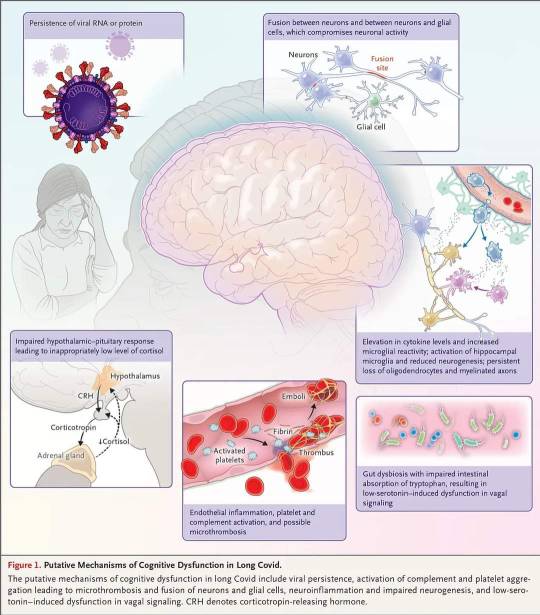
#LongCovid and Cognitive Deficits by @EricTopol
"None of this is good news for Long Covid and the brain, folks."
https://erictopol.substack.com/p/long-covid-and-cognitive-deficits?utm_campaign=post&triedRedirect=true
#psychiatry #neuroscience #BrainHealth #Neurology #brain #SARSCoV2 #COVID19 #CentralNervousSystem #NervousSystem #BrainFog
#Long COVID#psychiatry#Neuro Science#Brain#Brain Health#Neurology#SARSCOV2#COVID19#Brain Fog#central nervous system#nervous system
4 notes
·
View notes
Text
not sure i'm the right person to talk about this, but i've noticed that people don't take the time to absorb anything.
y'all talk about consuming media and bingeing, and the thing about that is that you're not taking the time to actually absorb what it is you've watched, heard, and/or read. you're all gut reaction at that point, and that definitely shows in all the bad media analysis i've seen.
it's like reacting before you've had time to take stock of a situation. once you've analyzed what's happening, you can make an informed decision on what to do. if you react before you know what's happening, mistakes will be made.
think of school. wasn't all that reviewing so BORING? you already learned it in one lesson! why go over it again?
the answer to that is to understand the material better. same goes w the media you experience. if you take your time watching, listening, and/or reading, you'll be able to understand it better.
i know life is short, but trust me, it's not that short. you can afford to take your time. you live fast and you'll die fast. you'll miss out on things in your hurry.
this is also a contributing factor to why people are so forgetful these days. you're taking in so much information that you're bound to lose things as it makes its way to long term memory. think about it as having limited RAM. your processing power can't handle it, your computer WILL slow down. and the more you force it to work through, the worse that gets. you only have one brain. you can't replace it. (just keep it working. do some puzzles, engage in brain games!)
anyway. slow down. enjoy things, actually digest them. stop bingeing. it's not impressive, it's just being cruel to your brain.
also, for the love of fuck, drink some fucking water!
#fandom#fandom culture#bingeing#media analysis#mental health#brain health#health#i don't know what to tag this as tbh#nana talks tag
5 notes
·
View notes
Text
Amazing. "Simplified" Map of the Brain.
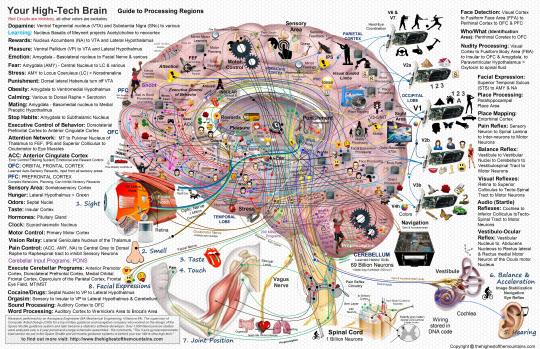
=> Hi-res PDF version here.
=> This is the most complicated organ we have, and we are trying to replicate some of its functionality with AI. More info here: https://thehighestofthemountains.com/brainmaps.php
36 notes
·
View notes
Text
Avoiding caffeine on an empty stomach is also ideal for hormone balance, for those with a compromised gut, and for those with anxiety.
#caffeine#caffeine addiction#cortisol#anxiety#anxiety relief#stress#stress less#stress reduction#stress reliever#stress management#coffee#hormone balance#hormone imbalance#guthealth#gut#gut health#brain health#hormone health
15 notes
·
View notes
Text
Feeling lost in a maze of online conspiracies? Wish you had a superpower to sort fact from fiction?
Learn how to identify conspiracy theories in just 2 minutes! This new video and article from #BoostYourBrain teaches you critical thinking skills to become a master of your online world.
Check out the video
https://youtu.be/FJ3PTzFH15c?si=Vjw09qPx4h7m7Cvc
Read the full article
https://medium.com/@BYB79/identify-conspiracy-theories-in-2-minutes-fact-check-your-world-9cba2dc74aee

#critical thinking#information#fake news#life hacks#positive mental attitude#encouragement#conspiracy theories#How to#knowledge is power#brain health#truth seekers
3 notes
·
View notes
Text
“Without a healthy brain, nothing in your life is as good as it could be.” - Dr. Daniel Amen
#that hit#brain health#priorities#train your brain#heal your brain#podcast#quotes#dr Daniel amen#Daniel amen
32 notes
·
View notes
Text
The Full Awareness of All Nerves
A Deep Dive into Our Body’s Silent CommunicatorsThe human body, a marvel of nature, operates with a complexity that often goes unnoticed. Central to this intricate system is the network of nerves, the silent communicators orchestrating our every move, thought, and sensation. Let’s embark on a journey to understand these fascinating elements of our biology.Firstly, consider the brain and spinal…

View On WordPress
#Brain Health#Consciousness#Human Anatomy#Kundalini Awakening#Nervous System#Neurons#neuroscience#Peripheral Nervous System#Sciatic Nerve#Sensory Perception#Spinal Cord
2 notes
·
View notes